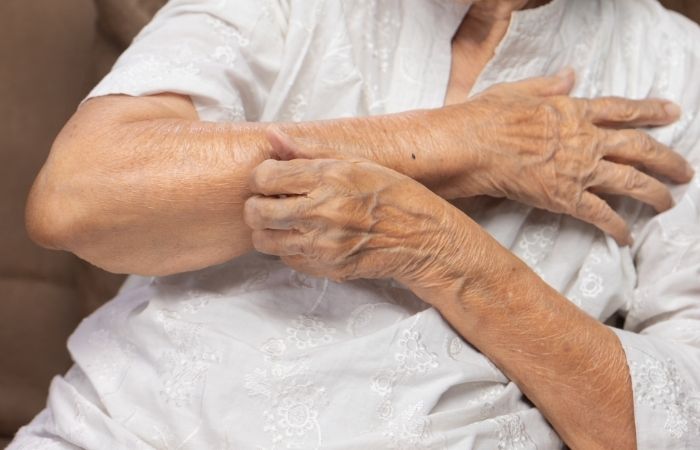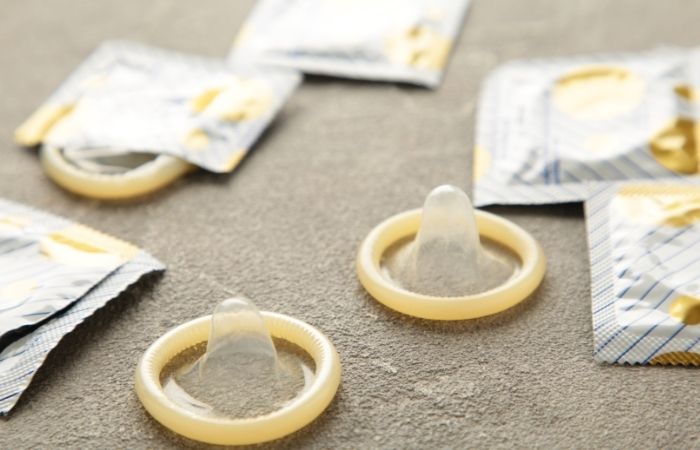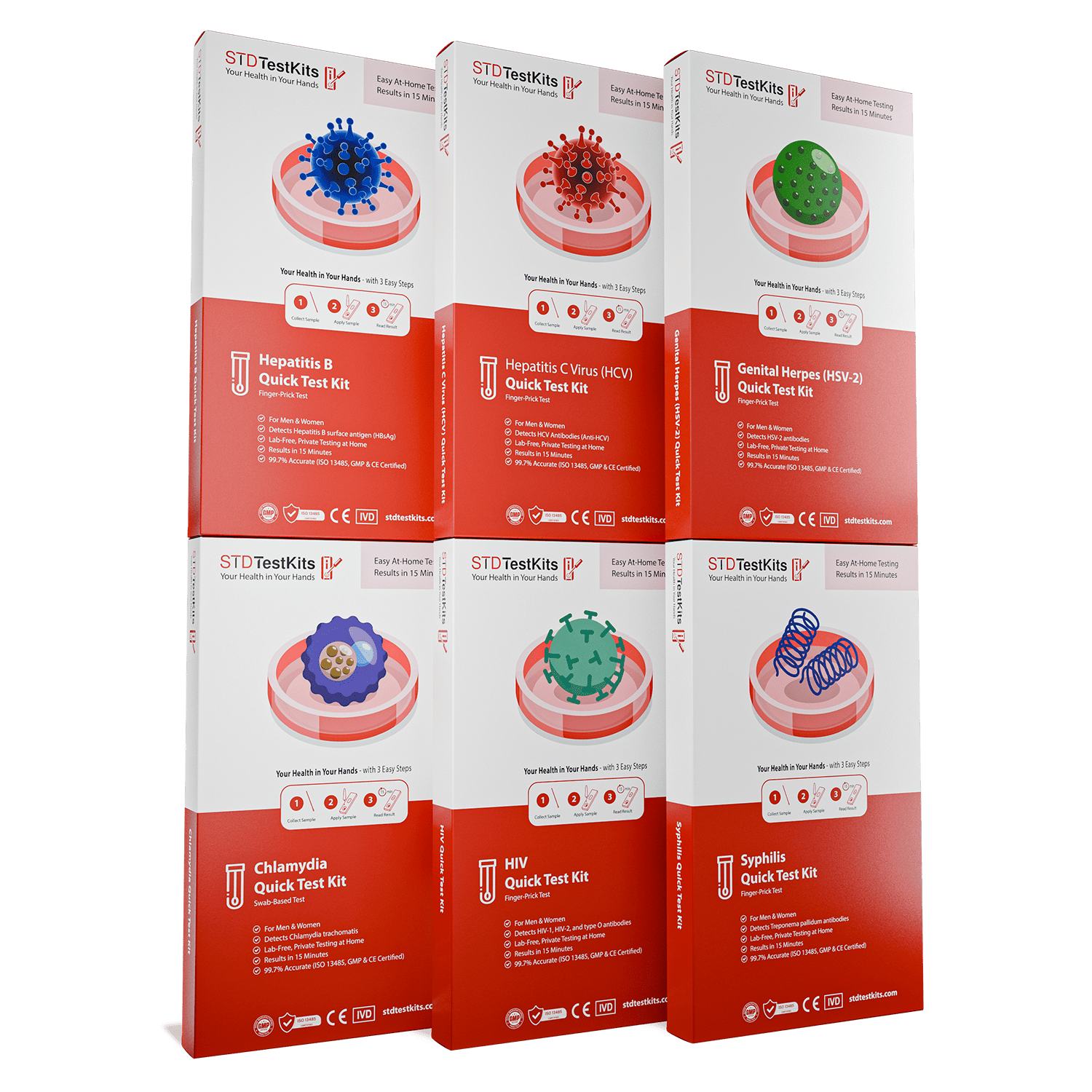Polyamory and STDs: Are You Really at Higher Risk?
Quick Answer: STDs in older adults are more common than people think. Yes, seniors can get STDs, often without symptoms. Protection, testing, and communication matter at every age.
This Isn’t Menopause, It’s an STD Symptom
Genital rash at 68? Burning when you pee, but no UTI? Sex hurts, but you're postmenopausal? These aren’t just aging annoyances. They could be warning signs of infections like Herpes, Chlamydia, or even Gonorrhea.
Many seniors brush off these symptoms, assuming it’s dry skin, a bladder issue, or just part of getting older. But here's the reality: STDs can mimic common age-related conditions, and they’re often overlooked because no one expects them.
- Rash: Could be mistaken for eczema or heat rash
- Burning: Misdiagnosed as UTI or bladder issue
- Itching: Attributed to dry skin or hygiene changes
- Painful sex: Assumed to be hormonal, not infectious
These symptoms are easy to miss, and even easier to ignore. But age doesn’t protect you from transmission. If you’re sexually active, you’re at risk.

People are also looking for: Cold Sore or Herpes?
“I Thought I Was Too Old to Get Anything”
Ray, 71, divorced and living in Arizona, started dating again after two decades of marriage. When he noticed a sore on his penis, he panicked.
“I told myself it was a heat rash. Or maybe from biking too much. Herpes? That was for teenagers, I thought.”
Ray waited three weeks before seeing a urologist. The diagnosis? Genital herpes. He felt confused, embarrassed, even ashamed. The worst part? He almost didn’t get tested because he thought STDs couldn’t happen “at his age.”
Stories like Ray’s aren’t rare. According to the CDC, rates of chlamydia, gonorrhea, and syphilis are all climbing among older adults. Especially in people over 65, who now make up the fastest-growing demographic for STIs in some regions.
Let’s be clear: you can test positive at any age, even without symptoms, and even if your last partner was years ago.
Myth-Busting: What Older Adults Get Wrong About STDs
It’s not your fault. You probably didn’t get comprehensive sex ed. Maybe the last time you learned about condoms was decades ago, back when they were whispered about in health class.
Here are the most common myths still hurting older adults today:
- “I can’t get an STD after menopause.” False. Hormonal changes don’t block infection.
- “We’re both widowed, we’re clean.” Testing isn’t retroactive. Past partners matter.
- “Condoms are for pregnancy, not people my age.” False again. Condoms reduce STI risk at any age.
- “If I had something, I’d know.” Many STDs are silent, especially in older bodies.
These myths don’t just cause confusion, they cause harm. They delay diagnosis, increase transmission, and make people like Ray feel too embarrassed to ask for help. If you’re nodding along, you’re not alone. The shame stops here.
Why STIs Are Quietly Rising in the Senior Population
Here’s the truth: seniors are having more sex than most people think. Retirement communities, dating apps, and second-chance romance are all fueling a vibrant (and often unprotected) sex life in people over 60. That’s not the problem, the lack of protection is.
According to data from the Centers for Disease Control and Prevention (CDC), STDs among older adults have risen steadily in the past decade. Why?
- Condom fatigue or disuse: Older adults often stop using protection post-menopause or after vasectomy
- Dating app accessibility: More people are finding new partners faster, but not always discussing testing
- Lower testing rates: Many seniors aren’t regularly screened because providers don’t ask
- Misdiagnosis or dismissal: Symptoms are often mistaken for aging or other conditions
This is not about shaming older adults, it’s about protecting them. Sex doesn’t end at 60, and neither should safety.
What STDs Look Like After 60 (Spoiler: It’s Not Always Obvious)
Older adults often present symptoms differently, or not at all. That’s why it’s so easy to miss the signs.
Here’s what to look for, even if it seems “normal” or unrelated:
- Genital rash: Could be herpes, syphilis, or a fungal infection
- Burning during urination: Often confused with UTI but could be chlamydia or gonorrhea
- Small bumps or sores: Herpes or genital warts can be subtle or mistaken for skin tags
- Pain during sex: May indicate infection, even if postmenopausal dryness is also present
- No symptoms at all: Many seniors test positive while feeling perfectly fine
One woman in a recent PubMed case study tested positive for syphilis during a routine blood panel, no symptoms, no suspicion. Just a fluke catch that probably saved her life. That’s why testing matters, especially if you're in a new relationship, sexually active, or dating after divorce or widowhood.
How to Talk About Testing Without Killing the Mood
This is where most people freeze. You're finally connecting with someone new, and suddenly you’re supposed to bring up STD testing? Awkward. Vulnerable. Terrifying.
But here's the deal: if you can undress in front of someone, you can talk about testing. And when you frame it with confidence and compassion, it doesn’t kill the vibe, it builds trust.
- Start light: “Hey, before we get closer, I always like to check in about sexual health. Have you been tested lately?”
- Share first: “I recently got an at-home test, it was quick and gave me peace of mind.”
- Suggest together: “Want to do a home test together this weekend?” (yes, people actually do this!)
For many seniors, home testing is less intimidating than clinic visits. If your doctor never brings up STDs, that doesn’t mean you’re safe, it just means it’s up to you.

People are also reading: Why Nevada’s STD Surge Isn’t Just a Vegas Problem (But It Should Scare Us All)
“I Was 64, He Was 66, and We Didn’t Think Twice”
Martha, 64, met her now-partner Jim on a local widowers’ Facebook group. After six months of holding hands, chatting, and long walks, they slept together. No condoms. No conversation. Just trust and affection.
“We assumed we were safe. No one had been with anyone else in years, right?”
When Jim started experiencing painful urination, they assumed prostate issues. Instead, a urine panel revealed gonorrhea. They were shocked.
“We weren’t reckless. We were just ignorant.”
Both got treated. Now they test regularly, and talk openly about their experience with friends, hoping to normalize the conversation.
What Tests Do Seniors Actually Need?
If you’re over 50, sexually active, and not in a fully monogamous relationship with a recently tested partner, here’s what medical experts recommend:
- Chlamydia & Gonorrhea: Urine test or swab, often combined in one kit
- Syphilis: Blood test, especially important since symptoms can be silent for years
- Herpes (HSV-2): Swab test if you have a sore, or blood test for antibodies
- HIV: Rapid finger prick or lab-based blood test
- Hepatitis B & C: Blood test, especially if you’ve had multiple partners or past blood transfusions
You don’t need to wait for symptoms to test. In fact, the earlier you screen, the easier it is to treat or manage any potential infection. If your provider doesn’t offer these tests, this at-home combo STD kit covers the essentials. Bonus: It’s discreet, accurate, and built for privacy, especially for people who want answers without making an appointment.
Why Some Doctors Still Don’t Ask Seniors About Sex (and Why That Needs to Change)
Here's a brutal truth: many health care providers still don't screen older adults for STDs. They assume you’re not sexually active. Or they don’t want to “offend” you. Or they don’t know how to bring it up.
The Mayo Clinic confirms that older patients are rarely counseled about sexual health, even though they’re at risk. That means the responsibility often falls on you.
Here’s how to take control:
- Before your next checkup, write down your symptoms, even if they feel unrelated
- Ask directly: “Can I be screened for STDs today?”
- Don’t let embarrassment silence your health
You deserve the same preventative care and respect as anyone in their 20s. Your sexuality isn’t expired, it’s still valid, vibrant, and worth protecting.
Condoms Aren’t Just for College Kids
Let’s say it louder for the folks in the back: Condoms prevent STDs, not just pregnancy. They protect against herpes, HIV, chlamydia, gonorrhea, and syphilis, even if you're beyond reproductive years.
Yet, studies show condom use in people over 60 is lower than any other age group. Why?
- “I can’t get pregnant, so I’m safe.” STDs still spread through fluid and skin contact
- “It’s awkward to bring up.” Not as awkward as a lifelong herpes diagnosis
- “They don’t fit well anymore.” Try different brands, many cater to comfort and sensitivity
And yes, if you have arthritis, mobility issues, or dexterity problems, lube and positioning tools can help. Planned Parenthood has senior-friendly guides on safe sex practices. So do many sex-positive blogs and forums tailored to aging adults. Bottom line? It’s not about shame, it’s about protection, pleasure, and peace of mind.

People are also reading: Why HIV Testing After Anal Sex Could Save Your Life
FAQs
1. Is it possible to get an STD after 60?
Yes. STDs don't care how old you are. Seniors can get infections from unprotected sex, especially if they are dating new people after a divorce, the death of a spouse, or a long time of being single.
2. What are some common signs of STDs in older adults?
Some of the symptoms are a rash on the genitals, itching, painful urination, sores or bumps, and pain during sex. But a lot of infections don't show any signs at all.
3. Do seniors really need to use condoms?
Yes, for sure. Even if you're not worried about getting pregnant, STDs like herpes, gonorrhea, HIV, and chlamydia can still be spread through sexual contact and skin-to-skin contact.
4. Is it possible to test for STDs at home?
Yes. At-home STD test kits are private, accurate, and great for people who don't want to talk to their doctor or who don't want to be seen.
5. Is it normal for sex to hurt after menopause?
Sometimes, but if it keeps happening, hurts, or is with other symptoms, get tested. Chlamydia and herpes are two infections that can make sex painful.
6. How do I bring up STD testing with a new partner?
Be nice and truthful. "I want us both to be safe before we get closer," you could say. I took the test; have you? It doesn't make things tense; it builds trust.
7. Do I still need to test if I don't have any symptoms?
Yes. Many STDs don't show any symptoms, especially in older people. Testing is about being clear, not having a crisis.
8. Does Medicare pay for STD tests?
Yes, in many cases, especially for tests like HIV, hepatitis, and syphilis. Find out what your coverage includes by asking your provider.
9. How do herpes and a rash differ?
Blisters are common with herpes, but rashes from irritation or eczema usually look flatter. The only way to be sure is to test.
10. My partner doesn't show any symptoms, can I still catch herpes?
Yes, herpes can be spread even without sores or visible symptoms. That's why it's important to get tested and use protection, even when things seem "normal."
You Deserve Answers, Not Assumptions
Whether you're 27 or 77, your health, and your sexuality, deserve respect. Getting tested isn't an admission of guilt. It's an act of care, protection, and power. The rules didn’t change just because you’ve got gray hair now. Don’t wait for a rash, a panic, or a heartbreak. Start the conversation. Ask the questions. And if no one else is talking about this stuff in your age group? Be the one who does. This at-home combo test kit checks for the most common STDs discreetly and quickly, no shame, no wait, just answers.
Sources
1. CDC – How to Prevent STIs (Prevention Steps and Strategies)
2. AMA – STIs on the Rise Among Older Adults: What Doctors Can Do
4. NCBI – Sexually Transmitted Infections in the Elderly (Review)







